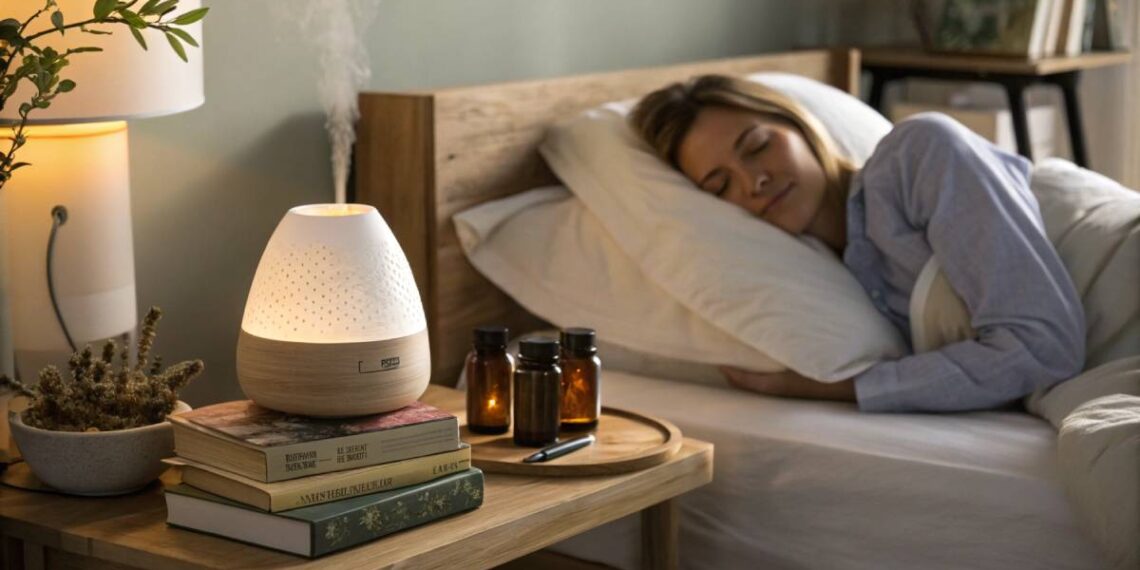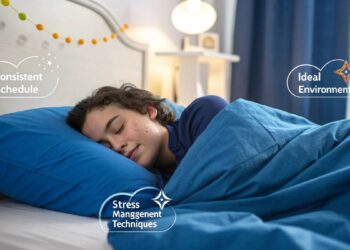Ever lie awake at night, your mind racing while your body craves rest? Quality sleep is more than just clocking hours—it’s the foundation of a healthy, vibrant life. Imagine waking up refreshed, with clear thoughts, balanced emotions, and a body ready to tackle the day. Whether you’re battling stress, irregular schedules, or restless nights, transforming your sleep can revolutionize your well-being. Dive into our ultimate guide on natural sleep improvement strategies, and discover how simple changes can lead to peaceful, restorative nights and energized mornings.
Key Takeaways
- Why Sleep Quality Matters
- Physical Health: Repairs muscles, balances hormones, and supports heart health.
- Mental Clarity: Enhances memory, problem-solving, and decision-making skills.
- Emotional Stability: Reduces stress and balances mood.
- Immune Function: Strengthens the body’s defense against illnesses.
- Common Sleep Disruptors
- Insomnia: Difficulty falling or staying asleep due to stress or poor habits.
- Sleep Apnea: Interrupted breathing patterns that degrade sleep quality.
- Restless Leg Syndrome: Involuntary leg movements disrupting rest.
- Shift Work: Irregular hours that confuse the body’s internal clock.
- Establishing Healthy Sleep Habits
- Maintain a consistent sleep schedule.
- Create a relaxing bedtime routine.
- Optimize the sleep environment for comfort and tranquility.
- Natural Remedies for Better Sleep
- Herbal Teas & Supplements: Chamomile, valerian root, melatonin.
- Aromatherapy: Lavender, jasmine, sandalwood oils.
- Relaxation Techniques: Meditation and deep breathing exercises.
- The Role of Diet
- Promote Sleep: Almonds, bananas, kiwi, warm milk.
- Avoid: Caffeine, heavy meals, spicy foods, alcohol, sugary snacks.
- Physical Activity and Stress Management
- Regular exercise improves sleep efficiency and duration.
- Stress-reducing practices like yoga, journaling, and nature walks enhance relaxation.
- Seeking Professional Help
- When sleep issues persist, consult healthcare providers.
- Explore therapies like Cognitive Behavioral Therapy for Insomnia (CBT-I), acupuncture, or massage therapy.
Importance of Quality Sleep
Quality sleep is like hitting the reset button for your body and mind. It’s not about just clocking in hours under the covers; it’s about how deep and refreshing those hours are.
Understanding the Impact of Sleep on Overall Health
Catching good z’s is crucial for keeping things in check from head to toe. Here’s why sleep matters:
- Physical Health: When you sleep, your body gets busy repairing your heart and blood vessels, fixing up muscles, and balancing hormones.
- Mental Clarity: Rest is like a mental filing cabinet, sorting memories, sharpening problem-solving skills, and helping with decisions.
- Emotional Stability: A solid sleep can keep your mood in check, dial down stress, and boost how you handle emotions.
- Immune Function: Snoozing helps power up your immune system, making it tough on germs and viruses.
Here’s the lowdown:
| Benefit | Description |
|---|---|
| Physical Health | Fixes heart, vessels, balances hormones |
| Mental Clarity | Boosts memory, solves problems, improves decisions |
| Emotional Stability | Lifts mood, cuts stress |
| Immune Function | Powers up immune defenses |
Want to snooze better naturally? Find out how over at natural ways to improve sleep.
Common Issues Affecting Sleep Quality
There are a bunch of things that can mess with your shut-eye:
- Insomnia: Can’t drift off or keep waking up? Blame stress, worry, or bad night habits.
- Sleep Apnea: Your breath starts hitting the breaks while you snooze, causing frequent wake-ups and crappy quality sleep.
- Restless Leg Syndrome: Got jittery legs that won’t stay still? They’re sleep wreckers.
- Shift Work: Odd work hours can throw your internal clock all out of whack.
Here’s a rundown of pesky sleep troubles:
| Issue | Description |
|---|---|
| Insomnia | Trouble falling or staying asleep |
| Sleep Apnea | Breathing stops and starts during sleep |
| Restless Leg Syndrome | Legs itch to move, interrupting sleep |
| Shift Work | Irregular work hours mess with sleep patterns |
Tackling these issues can make a world of difference. For more advice, check out sleep improvement techniques and strategies for enhancing sleep.
Getting wise to why sleep is a big deal and spotting what’s messing it up can get you on track to snooze-ville. For more tips, see our top sleep improvement tips and proven sleep improvement techniques.
Establishing Healthy Sleep Habits
Getting your snooze on just right is a game-changer for feeling fresh and lively. Sticking to a regular sleep schedule, setting up chill bedtime vibes, and tweaking your sleep space can make catching those Z’s a whole lot better.
“A consistent sleep schedule is the key to training your internal clock for deeper, more restorative sleep.”—Dr. Matthew Walker, Author of Why We Sleep.
Consistent Sleep Schedule
Your body’s like a clock and it loves routine. Hitting the hay and getting up at the same time daily, even on the weekend, can do wonders for how well you sleep.
| Day | Bedtime | Wake-up Time |
|---|---|---|
| Monday | 10:00 PM | 6:00 AM |
| Tuesday | 10:00 PM | 6:00 AM |
| Wednesday | 10:00 PM | 6:00 AM |
| Thursday | 10:00 PM | 6:00 AM |
| Friday | 10:00 PM | 6:00 AM |
| Saturday | 10:00 PM | 6:00 AM |
| Sunday | 10:00 PM | 6:00 AM |
Keeping your sleep times steady helps your brain figure out when to drift off and when to hop up, making your slumber more solid. Need more tips on this? Check our sleep quality improvement tips.
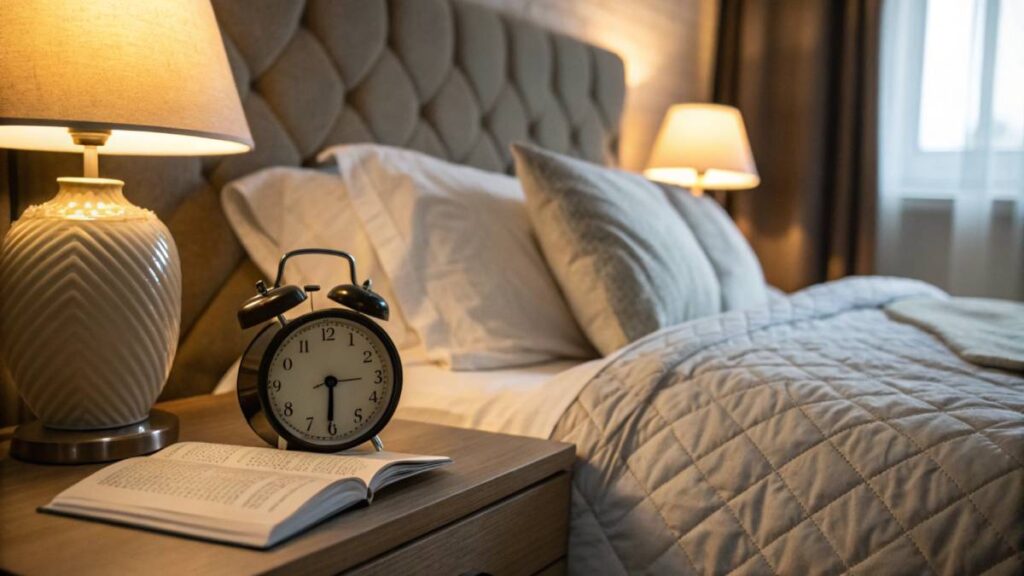
Creating a Relaxing Bedtime Routine
Want to nod off with ease? Wind down with a few chill pre-bed activities. It’s your body’s cue to start shutting down shop.
- Dust off a Book: Pick something mellow.
- Soak in a Warm Bath: Great for easing those tired muscles.
- Try Some Meditation: Clears your thoughts.
- Vibe to Soothing Tunes: Lulls you into relaxation.
Crafting a pre-sleep chill routine gets your body ready to snooze, making falling asleep a breeze. Discover more about these sleep improvement routines to make your evenings serene.
Optimizing Your Sleep Environment
To sleep like a log, set up your bedroom just right. Tweak stuff like room temp, silence, and dimming the lights.
- Chill Out the Temp: Keep it cool at 60-67°F.
- Quiet Please: Try earplugs or a white-noise gadget.
- Dim the Lights: Blackout curtains or a sleep mask work wonders.
- Snug Bedding: Mattresses and pillows should be comfy and supportive.
| Factor | Ideal Condition |
|---|---|
| Temperature | 60-67°F |
| Noise Level | Quiet, minimal interruptions |
| Light Level | Dark to cozy dim |
| Bedding | Soft yet supportive |
Tweaking your snooze zone can really up your sleep game. Jump into our sleep environment optimization tips for more insights.
Natural Remedies for Better Sleep
If counting sheep just isn’t cutting it, there’re plenty of natural tricks to help you catch those z’s. Let’s check out three down-to-earth remedies: herbal brews and chill pills, smell-good oils, and calming moves like meditation and belly breathing.
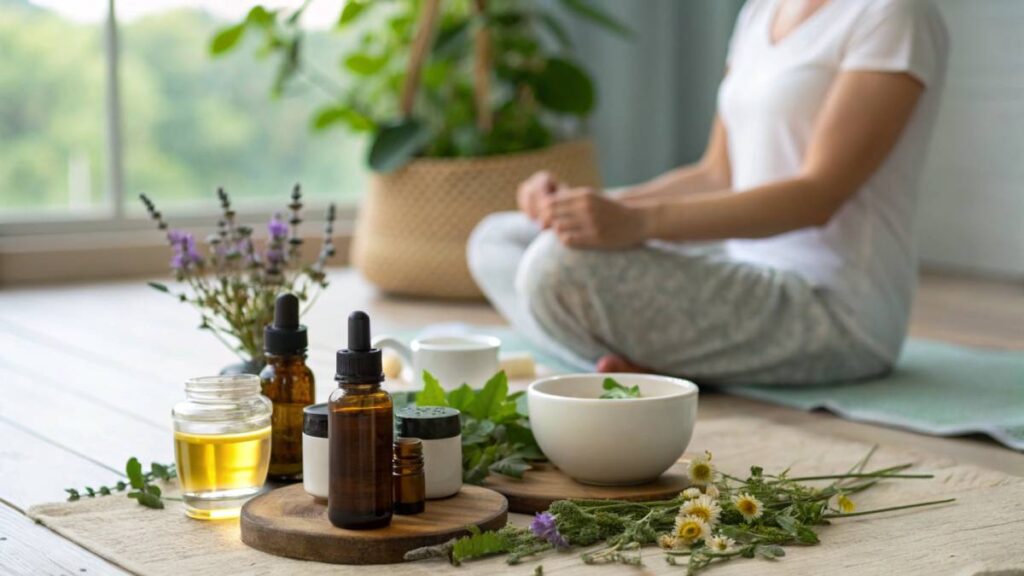
Herbal Teas and Supplements
Herbal teas and supplements are like a cozy blanket for your soul. A few plant heroes like chamomile, valerian root, and melatonin have been known to help folks find their snooze groove.
| Herbal Tea/Supplement | Benefit |
|---|---|
| Chamomile Tea | Soothes frayed nerves, takes down anxiety a notch |
| Valerian Root | Eases you into dreamland quicker |
| Melatonin Supplement | Keeps your body clock in check |
Knowing the perks of these natural buddies helps in making wise choices. Get the whole scoop in our section on getting better sleep the natural way.
Aromatherapy and Essential Oils
Aromatherapy might just be the fairy godmother of bedtime. Toss in a little lavender, jasmine, or sandalwood oil, and you’ve got a recipe for sweet dreams.
| Essential Oil | Effect on Sleep |
|---|---|
| Lavender | Melts away stress like a hot fudge sundae in July |
| Jasmine | Brings on the zen vibes |
| Sandalwood | Paves the way for a peaceful snooze |
Use a diffuser to sprinkle some magic into the air, or dab a smidge on your skin for a sleepytime treat. Discover more in our article on how to sleep better with smells.
Relaxation Techniques such as Meditation and Breathing Exercises
These chill-it-out techniques help your brain and body ease into snooze mode. Meditation and deep belly breaths are some of the all-stars.
- Meditation: Clears the mental cobwebs, making room for relaxation.
- Deep Breathing: Slows down your heart, bringing on the calm.
| Technique | Benefit |
|---|---|
| Meditation | Lightens mental load and destresses like a pro |
| Deep Breathing | Quiets the heart and ushers in tranquility |
Slipping these tricks into bedtime habits can seriously ramp up sleep quality. Peek at our guide to sleeping soundly for the full lowdown.
Trying out these natural remedies could transform your night into a cocoon of serenity, upping the quality of your shut-eye. Pair these techniques with other get-better-sleep tips to notch up the rest factor. For the whole kit and caboodle, explore our top sleep solutions article.
Dietary Adjustments for Improved Sleep
What you eat can really make or break how well you catch those Z’s. By tuning into what’s on their plate before bed, folks can seriously up their snooze game in a natural way.
“The link between nutrition and quality sleep reveals how what we eat primes us for better or worse rest each night.”—Harvard School of Public Health.
Foods that Promote Sleep
Certain munchies have a knack for helping you nod off to dreamland. Loads of them are packed with goodness like tryptophan, magnesium, calcium, and the sleep-supporting superstar, melatonin.
- Almonds: A magnesium powerhouse that just might send you off to slumberland faster.
- Chamomile Tea: This cozy drink is full of chill-out antioxidants that help you unwind and get sleepy.
- Kiwi: With serotonin and antioxidants, these yummy green fruits can get you dozing quicker and longer.
- Milk: It’s a classic for a reason; brimming with tryptophan to pump up your melatonin levels.
- Bananas: Loaded with potassium and magnesium, they’re great for keeping those muscles nice and relaxed.
| Food Item | Key Nutrients | Sleep Benefits |
|---|---|---|
| Almonds | Magnesium | May improve sleep quality |
| Chamomile Tea | Antioxidants | Promotes relaxation and sleep |
| Kiwi | Serotonin, antioxidants | Enhances sleep duration and onset |
| Milk | Tryptophan, calcium | Assists in melatonin production |
| Bananas | Potassium, magnesium | Aids in muscle relaxation |
Want to dive deeper into natural sleep hacks? Check out our detailed lowdown on natural ways to improve sleep.
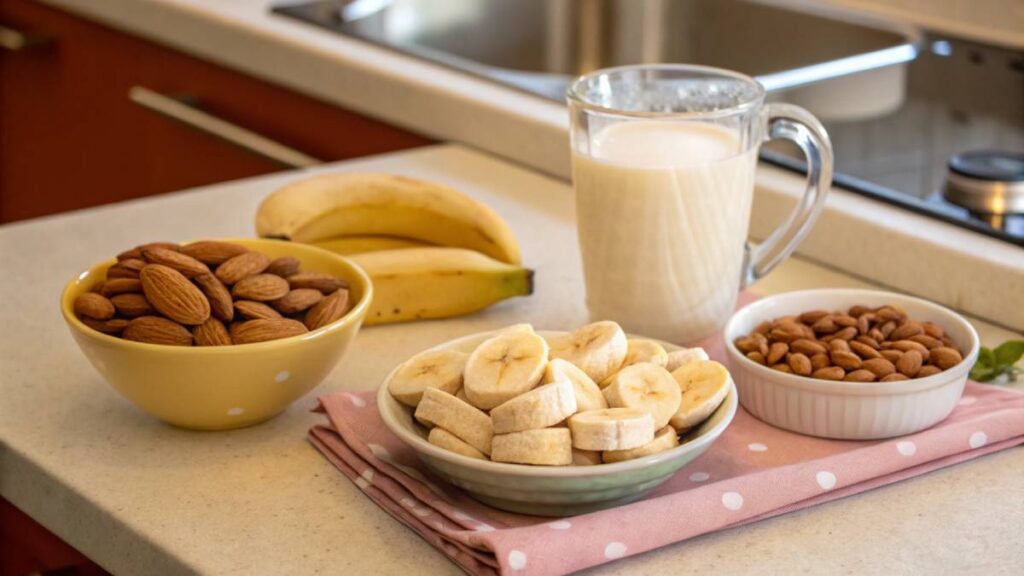
Foods to Avoid Before Bed
Just like there are foods that help you snooze, there are ones that can mess things up. Steering clear of these baddies before hitting the sack is crucial for sweet, peaceful dreams.
- Caffeine: From coffee to chocolate, this pesky stimulant can throw your sleep patterns into chaos.
- Heavy Meals: Munching on huge or rich meals too close to bedtime can leave you tossing and turning with a grumbly tummy.
- Spicy Foods: Watch out for these fiery dishes; heartburn and interrupted sleep are no fun.
- Alcohol: While that nightcap might knock you out, it can mess with your sleep cycle later on.
- Sugary Foods and Drinks: They might give you a quick energy buzz, but good luck falling asleep!
| Food/Drink | Potential Effects on Sleep |
|---|---|
| Caffeine | Disrupts sleep patterns |
| Heavy Meals | Causes discomfort and indigestion |
| Spicy Foods | Can lead to heartburn |
| Alcohol | Disrupts sleep cycle |
| Sugary Foods/Drinks | Causes energy spikes |
For a stash of more sleep-boosting insights, head over to our article on tips for better sleep.
Tuning your diet can work wonders for improving sleep quality naturally. Coupled with a few other lifestyle tweaks, you’ll be on your way to those oh-so-great sleepy nights. Need more tips to skyrocket your sleep quality? Peek at our all-inclusive guide on sleep optimization tips.
Physical Activity and Sleep Quality
Moving your body regularly plays a big role in naturally boosting your shuteye game. Let’s break down how working up a sweat helps you catch better Z’s and what you can do to maximize the snooze benefits.
Benefits of Regular Exercise
Getting moving regularly blesses your sleep in plenty of ways. It helps reset your body’s internal clock, takes the edge off stress, and helps you relax. Here’s a cheat sheet:
- Improves Sleep Efficiency: Folks who get their exercise in tend to sleep more soundly, enjoying deep, restorative slumber rather than tossing and turning.
- Eases Insomnia: Aerobic workouts, like jogging or cycling, can cut down the time it takes to drift off and ease insomnia symptoms.
- Stretches Sleep Time: Regular exercise can add more minutes to your sleep, making your nights more peaceful.
| Benefit | Effect on Sleep |
|---|---|
| Improves Sleep Efficiency | More deep sleep |
| Eases Insomnia | Faster to sleep |
| Stretches Sleep Time | Longer sleep |
Best Exercise Practices for Better Sleep
Getting the timing and type of exercise just right can give your sleep quality a hefty boost:
- Timing Matters: Plan to break a sweat at least 3 hours before you hit the hay to avoid being too wired at bedtime. Morning jogs or lunchtime hikes work wonders.
- Consistency is Key: Stick to a routine. Getting into a groove with regular workouts conditions your body for better sleep habits.
- Mix it Up: Blend aerobic activities like power walks, dives in the pool, or bike rides with some weight lifting and stretching for top-notch results.
- Keep it Chill: High-intensity workouts might pump you up more than you want right before bed. Moderate exercises are perfect for winding down.
| Practice | Recommendation |
|---|---|
| Timing | Exercise at least 3 hours before bed |
| Consistency | Regular, daily exercise |
| Variety | Mix of aerobics, strength, and flexibility |
| Intensity | Moderate workouts |
Check out more pointers on making your nights smoother with natural sleep boosters and sleep improvement tricks. Start weaving regular exercise into your daily life to reap the restful and rejuvenating rewards.

Managing Stress and Anxiety
If you’re trying to catch more z’s without popping pills, keeping a lid on stress and anxiety is key. Stress-busters and mindfulness can be your go-to for some snooze-worthy nights.
Stress-Busting Activities
Doing stuff that takes the edge off can make a world of difference for your sleep. Here’s what actually helps:
- Move Your Body: Whether it’s walking, jogging, or striking a yoga pose, getting your body moving pours a bucket of cold water on stress hormones, setting you up for dreamland. For more on how exercise can send you off to sleep, swing by lifestyle changes for better sleep.
- Get Crafty: Dive into painting, knitting, or playing some funky tunes on a guitar. These activities are like a mental vacation, steering your mind away from stress and bringing in some much-needed chill.
- Nature Time: Stepping out into the great outdoors can do wonders, dialing down stress and cranking up the quality of your shut-eye.
| Activity Type | Stress Reduction Power |
|---|---|
| Move Your Body | High |
| Get Crafty | Moderate |
| Nature Time | High |
Mindfulness and Chill Techniques
Mindfulness isn’t just a buzzword; it helps keep stress and anxiety in check, smoothing the path to better snoozing. Add these moves to your daily routine:
- Meditate a Little: Even if it’s just a few minutes a day, meditation can quiet your racing thoughts and ease you into relaxation mode. Guided sleep meditations are like the cherry on top. Want to dive deeper? Check out our natural sleep enhancement tips.
- Breathe Easy: Try simple breathing hacks like deep breathing or the 4-7-8 method. They’ll slow your heart down and chill you out.
- Muscle Meltdown: Tense and release your muscles one by one to chase away the physical tension and squash anxiety.
- Journal Jotting: Putting pen to paper and scribbling your thoughts can clear your mind and send stress packing, making nights more restful.
These practices clear the clutter in your mind, setting the stage for more peaceful slumber. Not only do they knock stress out of the park, but they also ramp up your life game.
By keeping stress and anxiety in check with these activities and mindfulness hacks, you’re on your way to snoozing like a champ. For more sleep-proof tips, wander over to our sleep improvement solutions.
Tech-Free Sleep Zone
Turning your bedroom into a gadget-free fortress is downright magical for better sleep. Those flashy screens and endless notifications can mess with your sleep mojo. Here’s how to set the scene for peaceful slumber without technology getting in the way.
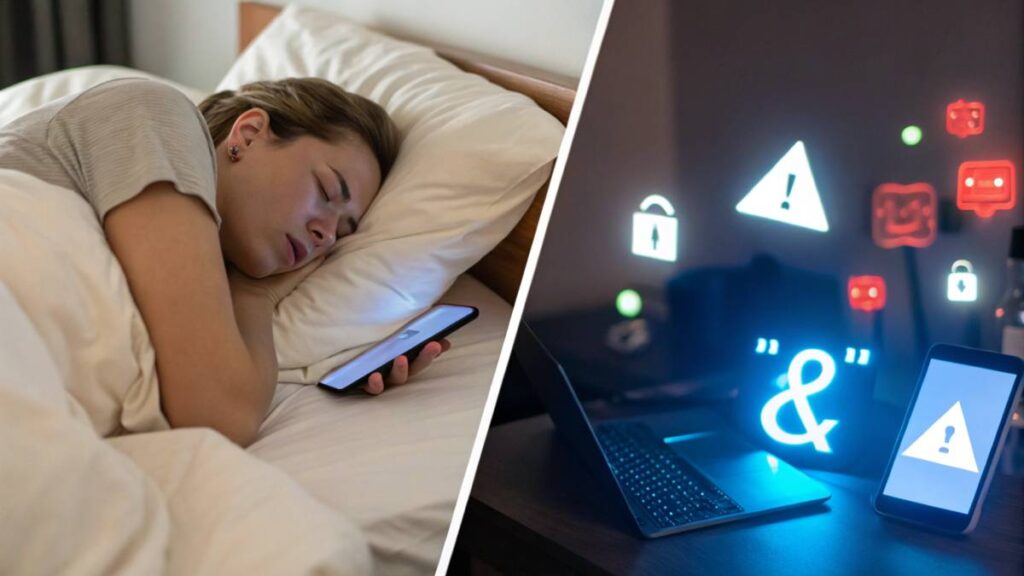
Limiting Screen Time Before Bed
Cutting down screen time seriously boosts your sleep game. The blue light from phones, tablets, and computers tricks your brain into thinking it’s still daytime, throwing melatonin—the sleep hormone—out of whack. Putting the brakes on screens before hitting the sack helps keep your internal clock on track.
| Activity | Screen-Free Wind-Down |
|---|---|
| Binge-watching TV | 1 hour pre-bed |
| Scrolling on Your Phone | 1 hour pre-bed |
| Late-Night Laptop Sessions | 2 hours pre-bed |
Instead of screen time, lose yourself in a good old-fashioned book or chill out with relaxation techniques like meditation. Not only do these activities signal bedtime, but they also spread a blanket of calm, prepping you for a sweet snooze.
Creating a Calm Environment for Sleep
Making your bedroom a zen den enhances sleep like a charm. A few tweaks can transform it into your restful haven:
- Soft lighting: As the sun goes down, let your lighting follow suit. Soft, dim lighting whispers to your body that it’s time to chill out.
- Snug bedding: Plush pillows and a mattress that cradles you right can make all the difference for sleep support.
- Cool it down: Keep your room like a cozy cave, ideally between 60-67°F (15-19°C), for prime sleepy vibes.
- Lower the volume: Silencing background noise with earplugs or using soothing sounds from a white noise machine can keep disturbances at bay.
Add some magical scents to the mix with aromatherapy and essential oils. Lavender and chamomile are known for mellowing things out, creating the perfect setting for catching z’s.
By turning your sleeping space into a tech-free haven, you set yourself up for dreamier nights. For more tips on snagging the perfect slumber, check out our pieces on sleep hygiene tips and natural sleep enhancement tips.
Seeking Professional Help
At times, even with the charm of grandma’s chamomile tea and following the ‘no phones before bed’ rule, some folks still toss and turn all night. That’s when waving the white flag and calling in the pros might just be the ticket to dreamland.
When to Consult a Healthcare Provider
If your eight hours of counting sheep look more like tossing-and-turning Olympics, it’s probably time to call in the sleep squad. Chronic insomnia, unwelcome nightly wake-up calls, or drooling on your desk mid-day aren’t normal and might mean you need a hand. Plus, conditions like sleep apnea or restless legs can sneak up and steal your Z’s.
| Symptom | When to Seek Help |
|---|---|
| Chronic Insomnia | After trying sleep hygiene tips for 4 weeks with no luck |
| Frequent Night Awakenings | If it’s interrupting your Netflix binge or work life |
| Excessive Daytime Sleepiness | When naps are your body’s new BFF despite sleeping a lot at night |
| Suspected Sleep Disorders | If your partner says you battle monsters in your sleep or kick like a soccer pro |
A health pro can play detective and figure out what’s really stealing your sleep. Tackling these issues early can keep bigger problems like a sluggish immune system, foggy brain, and grumpy moods at bay.
Alternative Therapies for Sleep Improvement
Beyond the usual meds and advice, some folks find a little sprinkle of alternative magic helps them snooze better. These are the kind of things you giggle about at yoga class but might actually work—at least, that’s what Dr. Google says.
- Cognitive Behavioral Therapy for Insomnia (CBT-I): Think of CBT-I like a brain boot camp. It helps kick out those bad thoughts keeping you up and swaps them for ones that say, “Hey, maybe I can sleep!” Imagine jump-starting your sleep habits with positive mojo. For more details, check out CBT-I and its benefits.
- Acupuncture: Picture a bunch of tiny needle hugs. It’s an old-school Chinese gig that might help by calming your energies and knocking out stress.
- Massage Therapy: Nothing says relaxation like a good ol’ rubdown. Whether it’s Swedish style or tearing into knots like a Thanksgiving turkey, massage can soothe you right into dreamland.
- Yoga and Tai Chi: These practices are like sending your nervous system to the spa. With a mix of moves, breathing, and zoning out, they can stretch you out and clear your head for bedtime.
Trying out these alternative paths might just be the extra boost needed for a stellar night’s sleep. By mixing natural tricks with healthy sleep habits and the pros’ guidance, anyone can shift from restless to restful nights. Craving more ideas to hit the hay better? Go ahead and visit our piece on natural ways to improve sleep.
Main Tips
- Maintain a Consistent Sleep Schedule:
Go to bed and wake up at the same times every day, even on weekends, to regulate your body’s internal clock. - Create a Relaxing Bedtime Routine:
Engage in calming activities such as reading, meditating, or taking a warm bath to signal your body it’s time to wind down. - Optimize Your Sleep Environment:
Keep your bedroom cool, dark, and quiet. Invest in comfortable bedding and reduce exposure to screens before bedtime. - Incorporate Sleep-Promoting Foods:
Include foods rich in magnesium and melatonin like almonds, bananas, and tart cherries in your diet. - Manage Stress Effectively:
Practice stress-reducing techniques like yoga, deep breathing exercises, or journaling to calm your mind before sleep.
Conclusion
Achieving quality sleep is a multifaceted journey that touches every aspect of your life. By understanding the profound impact sleep has on your physical health, mental clarity, emotional stability, and immune function, you can take proactive steps to enhance your nightly rest. Establishing healthy sleep habits, such as maintaining a consistent schedule and creating a calming bedtime routine, sets the stage for better sleep. Incorporating natural remedies like herbal teas and aromatherapy can further ease you into a peaceful slumber. Additionally, mindful dietary choices and regular physical activity play crucial roles in promoting restful nights. Managing stress through techniques like meditation and journaling ensures that your mind is as relaxed as your body. If persistent sleep issues arise, seeking professional help is a wise and proactive choice. Embrace these strategies to transform your sleep quality, leading to a healthier, sharper, and more balanced life. It’s time to reclaim your nights and wake up to brighter mornings!
FAQs
What are some foods that improve sleep quality naturally?
Foods like almonds, kiwis, bananas, and warm milk contain nutrients that help produce sleep-enhancing hormones like melatonin and serotonin.
Why is a consistent sleep schedule important?
Regular sleep and wake times align your body’s internal clock, making it easier to fall asleep and wake up refreshed naturally.
Can physical exercise improve sleep? What’s the best time to exercise?
Yes, regular moderate physical activity improves deep sleep. Aim to avoid high-intensity exercise at least 3 hours before bedtime.
What are common causes of poor sleep quality?
Stress, irregular schedules, conditions like sleep apnea or insomnia, consuming caffeine, and an uncomfortable sleep environment often disrupt rest.
When should I see a professional about my sleep issues?
If insomnia, frequent awakenings, or excessive daytime sleepiness persist for over 4 weeks despite lifestyle adjustments, consult a healthcare provider.
Resources
- The Sleep Foundation – Articles and research on improving sleep quality.
- Harvard Health Publishing – Evidence-based sleep tips and updates.
- Mayo Clinic Sleep Disorder Center – Professional guidance on addressing sleep issues.
Recommended Products and Accessories
- Mellanni Bed Sheet Set
Experience ultimate comfort with ultra-soft and wrinkle-resistant sheets that enhance your sleep quality. - Fitbit Charge 5 Fitness Tracker
Monitor your sleep patterns and gain insights to improve your nightly rest with this advanced fitness tracker. - Organic Chamomile Herbal Tea
Unwind with a soothing cup of chamomile tea, known for its natural sleep-inducing properties. - Essential Oil Diffuser with LED Lights
Create a calming atmosphere with this diffuser, perfect for aromatherapy to promote relaxation and sleep. - Sleep Headphones by CozyPhones
Enjoy your favorite soothing sounds or calming music without disturbing your partner with these comfortable sleep headphones.
Final Thoughts
Achieving quality sleep is a journey that intertwines with every aspect of your life, from your daily habits and diet to your emotional well-being and physical environment. By implementing consistent sleep schedules, creating a soothing bedtime routine, and embracing natural remedies, you set the foundation for restful nights and vibrant days. Remember, small changes can lead to significant improvements in how you feel and function. Prioritize your sleep as you would any other essential aspect of your health, and don’t hesitate to seek professional guidance if needed. Embrace these strategies to transform your sleep and, consequently, your overall quality of life. Sweet dreams are within your reach!

